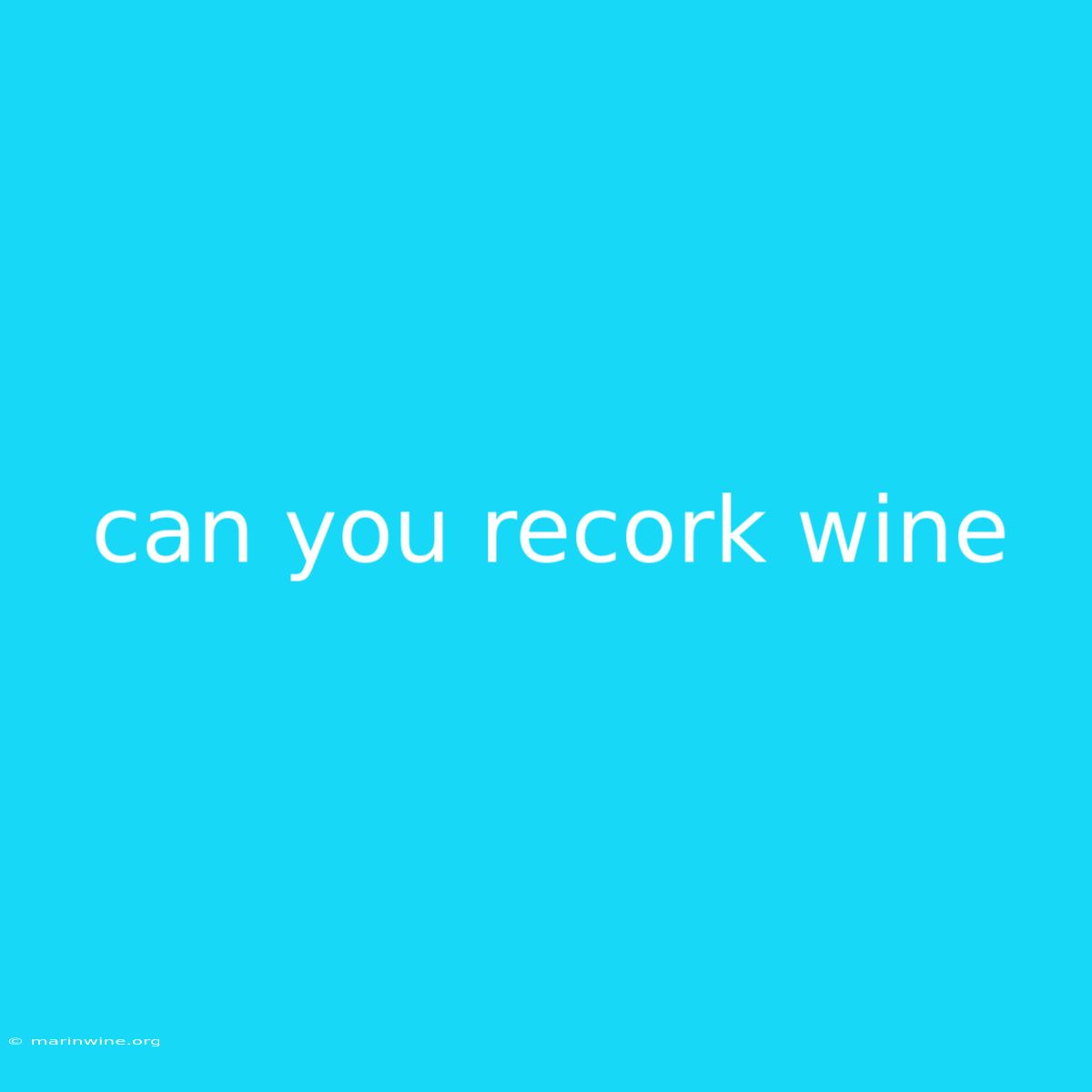Can You Recork Wine? A Guide to Wine Preservation
Editor's Note: Recorking wine is a common question among wine enthusiasts. This article provides definitive answers and helpful tips.
Why This Matters
Proper wine storage and preservation are crucial for maintaining its quality and flavor. Understanding whether and how to recork wine impacts the longevity and enjoyment of your favorite bottles. This review covers methods for recorking, identifying signs of spoiled wine, and alternative preservation techniques. We’ll explore topics like oxygen exposure, cork quality, and storage conditions, all impacting the overall preservation of your wine.
Key Takeaways of Wine Recorking
| Aspect | Description |
|---|---|
| Recorking Efficacy | Limited, best for short-term storage (1-2 days) |
| Oxygen Exposure | Primary factor affecting wine quality post-opening; recorking minimizes, but doesn't eliminate it. |
| Storage Conditions | Cool, dark place crucial for both opened and unopened bottles. |
| Alternative Methods | Vacuum pumps, inert gas systems offer superior preservation. |
Can You Recork Wine?
The simple answer is yes, you can recork wine. However, whether you should depends on several factors. Recorking primarily aims to minimize oxygen exposure, the biggest enemy of opened wine. However, it's not a foolproof method for long-term preservation.
Key Aspects of Wine Recorking
- Cork Quality: A good quality cork creates a tighter seal, reducing oxygen ingress. Damaged corks are less effective.
- Wine Type: Some wines, like robust reds, may withstand recorking better than delicate whites.
- Storage Conditions: Cool, dark storage significantly extends the life of recorked wine.
Discussion of Key Aspects
Cork Quality: Using a new cork is preferable to reinserting the original, especially if the original cork is damaged or compressed. A new cork ensures a better seal and minimizes air exposure.
Wine Type: Red wines with higher tannins and acidity generally tolerate oxidation better than whites. Recorking a robust red might yield drinkable wine for 2-3 days, while a delicate white might deteriorate more rapidly.
Storage Conditions: Storing the recorked wine upright in a cool, dark place is paramount. Temperature fluctuations and light exposure accelerate oxidation and spoilage.
The Connection Between Storage and Recorking
Proper storage is inextricably linked to the success of recorking. Even with a perfect reseal, improper storage renders recorking ineffective. High temperatures accelerate oxidation, while light exposure can lead to premature aging and off-flavors.
Facets of Proper Wine Storage
- Temperature: Ideal storage temperature is between 55-60°F (13-16°C).
- Light: UV light degrades wine quality; dark storage is vital.
- Humidity: Moderate humidity (50-70%) prevents cork from drying out and cracking.
- Vibration: Minimize vibrations to prevent premature aging.
Summary of Storage Effects
Maintaining proper storage conditions significantly extends the life of recorked wine, maximizing the benefits of the recorking process itself. Failing to maintain these conditions negates the effort.
FAQ
Introduction to Frequently Asked Questions
This section addresses common queries regarding wine recorking and preservation.
Questions and Answers
| Question | Answer |
|---|---|
| How long can I keep recorked wine? | 1-2 days maximum for most wines; robust reds might last slightly longer. |
| Can I reuse the original cork? | Ideally no; a new cork provides a better seal. |
| What are the signs of spoiled wine? | Vinegar-like smell, browning, dull appearance, off-flavors. |
| What are better alternatives to recorking? | Vacuum wine stoppers, inert gas preservation systems. |
| Does recorking work for all wine types? | No; delicate whites spoil faster than robust reds. |
| How should I store recorked wine? | Upright, in a cool, dark place, away from vibrations. |
Summary of FAQ
Recorking offers short-term solutions, but superior alternatives exist for longer preservation. Understanding signs of spoilage and employing proper storage is crucial.
Tips for Recorking Wine
Introduction to Recorking Tips
These tips enhance the success of recorking and prolong the enjoyment of your opened wine.
Recorking Tips
- Clean the bottle neck: Remove any debris before reinserting the cork.
- Use a new cork: Avoid reusing the original; a new cork provides a much better seal.
- Moisten the cork: Slightly moistening the cork allows for easier insertion and a tighter fit.
- Gently insert the cork: Avoid forcing the cork, which can damage it and create gaps.
- Store properly: Maintain ideal storage conditions to maximize wine quality.
- Consider alternatives: If keeping the wine longer than a day or two, consider vacuum pumps or inert gas preservation.
- Smell and Taste: Before consumption, always check for off-odors or tastes indicative of spoilage.
Summary of Recorking Tips
Following these tips increases the chances of successfully preserving opened wine. The focus should be on minimizing oxygen contact and maintaining proper storage.
Summary of Wine Recorking
This article explored the practicality and limitations of recorking wine. While a useful short-term solution for minimizing oxidation, it's not a perfect preservation method. Optimal storage, cork quality, and consideration of alternative preservation techniques are crucial for maintaining the quality of opened wine.
Closing Message (Pesan Penutup)
The enjoyment of a good wine extends beyond the initial opening. Understanding how to best preserve your opened bottle allows you to savour its flavors for longer. Experiment with different methods to discover what best suits your needs and wine preferences.

